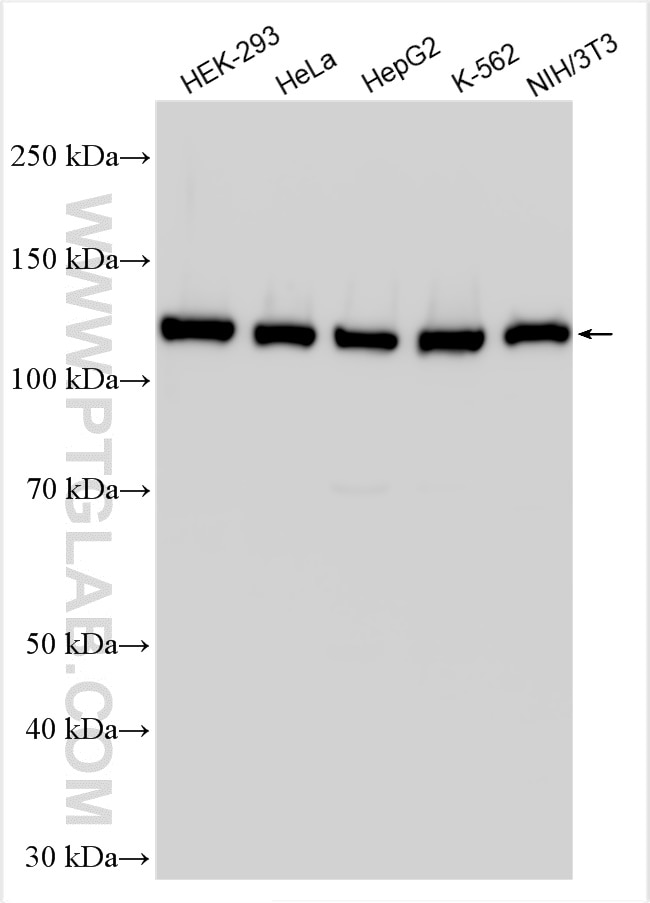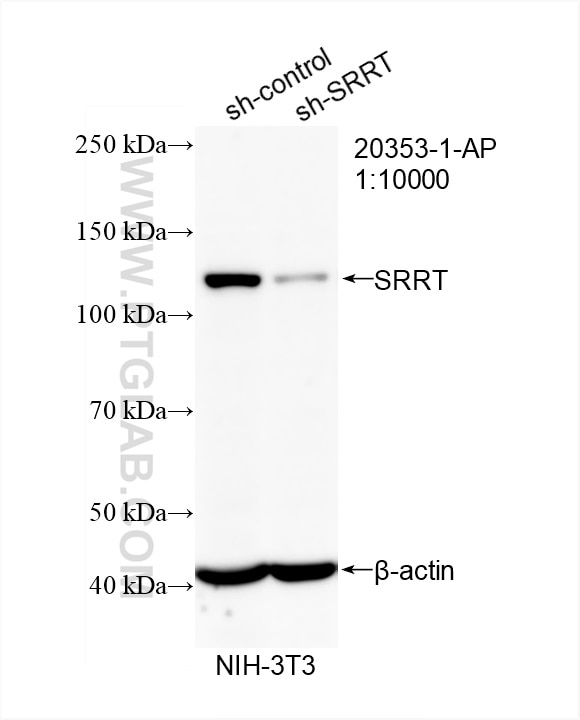- Phare
- Validé par KD/KO
Anticorps Polyclonal de lapin anti-SRRT
SRRT Polyclonal Antibody for WB, ELISA
Hôte / Isotype
Lapin / IgG
Réactivité testée
Humain, souris
Applications
WB, ELISA
Conjugaison
Non conjugué
N° de cat : 20353-1-AP
Synonymes
Galerie de données de validation
Applications testées
| Résultats positifs en WB | cellules HEK-293, cellules HeLa, cellules HepG2, cellules K-562, cellules NIH/3T3 |
Dilution recommandée
| Application | Dilution |
|---|---|
| Western Blot (WB) | WB : 1:2000-1:16000 |
| It is recommended that this reagent should be titrated in each testing system to obtain optimal results. | |
| Sample-dependent, check data in validation data gallery | |
Informations sur le produit
20353-1-AP cible SRRT dans les applications de WB, ELISA et montre une réactivité avec des échantillons Humain, souris
| Réactivité | Humain, souris |
| Hôte / Isotype | Lapin / IgG |
| Clonalité | Polyclonal |
| Type | Anticorps |
| Immunogène | SRRT Protéine recombinante Ag14196 |
| Nom complet | serrate RNA effector molecule homolog (Arabidopsis) |
| Masse moléculaire calculée | 876 aa, 101 kDa |
| Poids moléculaire observé | 120 kDa |
| Numéro d’acquisition GenBank | BC000082 |
| Symbole du gène | SRRT |
| Identification du gène (NCBI) | 51593 |
| Conjugaison | Non conjugué |
| Forme | Liquide |
| Méthode de purification | Purification par affinité contre l'antigène |
| Tampon de stockage | PBS avec azoture de sodium à 0,02 % et glycérol à 50 % pH 7,3 |
| Conditions de stockage | Stocker à -20°C. Stable pendant un an après l'expédition. L'aliquotage n'est pas nécessaire pour le stockage à -20oC Les 20ul contiennent 0,1% de BSA. |
Informations générales
SRRT (Serrate RNA effector molecule homolog) is also named as ARS2 (Arsenite-resistance protein 2). ARS2/SRRT is an essential eukaryotic protein that has emerged as a critical factor in the sorting of functional from non-functional RNA polymerase II (Pol II) transcripts (PMID: 34060620). SRRT protein is a key component of the nuclear cap-binding complex (CBC), which allows it to modulate the expression of various miRNAs. The SRRT protein is widely expressed throughout the eukaryotes, but not in budding yeast. SRRT has been shown to play a vital role in stem-cell renewal, proliferation, hematopoiesis, and RNA-mediated gene silencing and regulation of miRNA biogenesis (PMID: 37345203). SRRT is involved in cellular proliferation and colony formation (tumorigenicity). Similarly, high SRRT expression has been found in cholangiocarcinoma. ARS2 showed ubiquitous expression, with the highest levels in mouse testes, heart, and liver and human heart and skeletal muscle (PMID: 18086880).
Protocole
| Product Specific Protocols | |
|---|---|
| WB protocol for SRRT antibody 20353-1-AP | Download protocol |
| Standard Protocols | |
|---|---|
| Click here to view our Standard Protocols |



